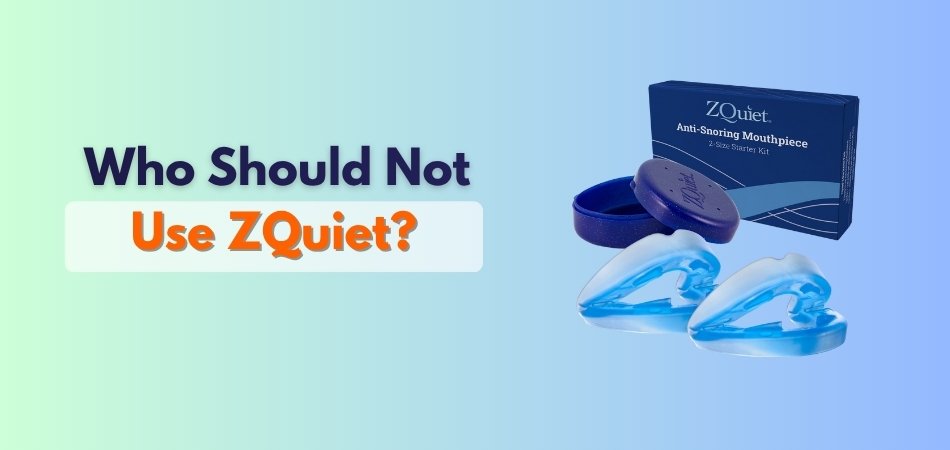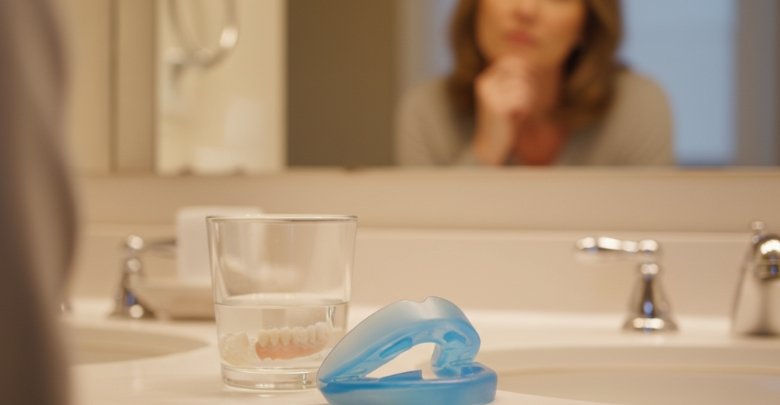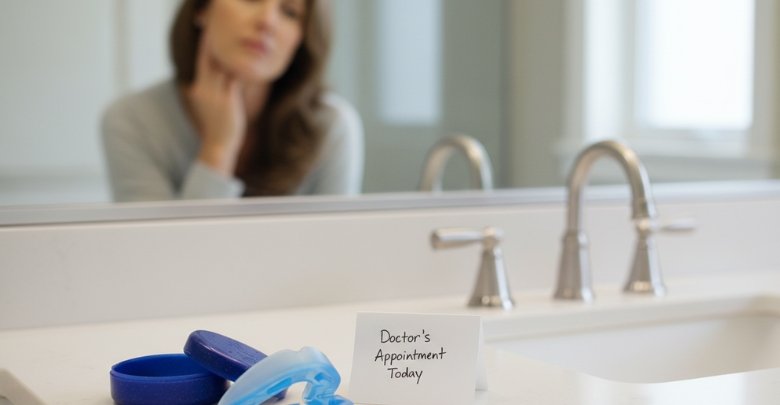Finding a reliable snoring solution can be life-changing, especially for those who struggle with restless nights. ZQuiet has become a popular choice for many because it helps improve breathing during sleep and reduces snoring effectively. Yet, understanding who it’s suitable for is just as important before trying it.
When it comes to Who Should Not Use ZQuiet, certain individuals need to take extra care. People with loose teeth, jaw pain, or diagnosed sleep disorders should be cautious. The device may not fit comfortably or could worsen existing conditions if used without professional guidance.
Knowing these details helps users make informed choices about their sleep health. If you’re wondering whether ZQuiet is the right fit for you, continue reading to discover the key factors and expert advice before using it.
Who Should Not Use ZQuiet?
Finding a comfortable and effective snoring solution can truly improve your quality of sleep. ZQuiet is a mouthpiece that slightly moves the lower jaw forward to help open airways and reduce snoring. While many users find success with it, several ZQuiet review discussions highlight that it’s not suitable for everyone due to specific oral or health conditions. Here’s a breakdown of the types of people who should avoid using ZQuiet.

People with Loose Teeth or Dental Issues
Individuals with loose, cracked, or missing teeth should avoid ZQuiet because the mouthpiece rests directly on the teeth. This pressure can cause discomfort or worsen existing dental problems. If you have implants, dentures, or gum disease, ZQuiet might not fit properly. It’s always best to seek a dentist’s opinion before use.
Those with TMJ or Jaw Pain
People with TMJ disorder or frequent jaw pain should not use ZQuiet. The device slightly moves your jaw forward to reduce snoring, which can strain the jaw joint. For those already dealing with stiffness or clicking sounds in the jaw, this pressure may cause inflammation or worsen discomfort during sleep. Professional guidance is essential here.
Individuals with Sleep Apnea
ZQuiet is created for mild to moderate snoring, not for treating sleep apnea. Using it without medical supervision may hide apnea symptoms, delaying proper treatment. If you frequently wake up gasping, experience pauses in breathing, or have severe snoring, you should consult a sleep specialist before trying any mouthpiece.
Pregnant Women and Teenagers
Pregnant women and teenagers are advised not to use ZQuiet. For pregnant women, hormonal and physical changes can affect the airway and jaw structure. For teenagers, jaw and teeth development is still ongoing, making oral appliances potentially harmful. In both cases, safer and simpler alternatives are more suitable for snoring control.
People Uncomfortable with Mouth Devices
ZQuiet requires users to sleep with a mouthpiece in place, which may not suit everyone. Some users find it uncomfortable and experience drooling, dryness, or restlessness at night. If you struggle with mouth guards or similar devices, ZQuiet may reduce sleep quality instead of improving it, making other options preferable.
Using ZQuiet responsibly begins with understanding whether it’s right for you. If you belong to any of these categories, consult your dentist or doctor before trying it. Proper medical advice ensures safety, comfort, and long-term oral health.
Why Certain People Should Avoid Using ZQuiet?
ZQuiet is designed to ease snoring by moving the lower jaw forward, helping air pass more freely during sleep. While this mechanism works well for many users, it can create challenges for people with specific oral or health issues. Understanding these concerns can help users avoid unnecessary discomfort and use ZQuiet safely. Here are the main reasons why some people should avoid using ZQuiet.
Jaw Pressure and Discomfort
ZQuiet applies mild forward pressure on the lower jaw to keep the airway open. This constant repositioning can cause tension or soreness, especially in those who already experience jaw tightness. Regular use without professional monitoring may lead to muscle fatigue or strain during sleep, reducing overall comfort and restfulness.
Dental and Gum Sensitivity
Although many find it helpful, not everyone finds ZQuiet safe for teeth, especially if there are gum or enamel issues. The device grips both upper and lower teeth, which can cause irritation for people with weak dental structures. Consulting a dentist before use can prevent discomfort, gum inflammation, or tooth movement.
Breathing or Airway Limitations
Those with nasal congestion, sinus issues, or breathing disorders should be cautious when using ZQuiet. The mouthpiece slightly limits natural airflow if the user breathes primarily through the mouth. For people with restricted nasal breathing, this can make sleep feel uncomfortable and lead to increased dryness or disrupted breathing patterns.
Jaw Joint Problems
For users suffering from TMJ disorder or jaw misalignment, the forward jaw adjustment may intensify pain. The extra tension can make the jaw feel stiff or sore upon waking. Without proper fitting or professional supervision, such users may find the device worsens their existing joint condition instead of improving sleep quality.
Using ZQuiet requires awareness of one’s dental and physical condition. If discomfort, pain, or breathing difficulty occurs, stop using it and seek professional advice. Proper guidance ensures safety and helps determine if an alternative snoring solution would be more effective for your needs.
Should People with Loose or Missing Teeth Try ZQuiet?
ZQuiet is a mouthpiece made to reduce snoring by keeping the airway open. It works by gripping both the upper and lower teeth to gently shift the jaw forward. This mechanism works for most users, but those with loose or missing teeth should use caution to avoid discomfort or dental strain. Here is how the device interacts with teeth for people with dental sensitivity or weak oral structures.

ZQuiet Applies Pressure on Both Dental Arches
The ZQuiet mouthpiece rests over the teeth and relies on gentle pressure to keep the jaw aligned. This positioning can be safe for people with strong, stable teeth, but risky for those with weak or missing ones. The pressure may cause soreness, wobbling, or additional movement in already unstable teeth.
Weak or Missing Teeth Increase the Risk of Discomfort
For users with fragile dental health, ZQuiet can create uneven tension that irritates gums and surrounding teeth. If the mouthpiece doesn’t sit evenly, it may lead to gum inflammation or tooth sensitivity. People with crowns, dentures, or implants may also feel discomfort due to the uneven grip.
Poor Fit May Worsen Dental Instability
If the ZQuiet mouthpiece does not fit properly, it can shift during sleep and place extra stress on certain teeth. Over time, this may worsen dental alignment or loosen existing weak spots. A custom fit or professional adjustment can reduce these issues, but cannot eliminate all risks for sensitive users.
Dental Consultation Is Essential Before Using ZQuiet
Anyone with missing, loose, or recently treated teeth should always consult a dentist before using ZQuiet. A professional can assess whether the device is appropriate and suggest safer alternatives if necessary. Getting expert guidance ensures both comfort and protection for your dental health while addressing snoring problems.
Using ZQuiet responsibly begins with understanding your dental condition. For those with fragile teeth or oral work, medical advice is key to ensuring comfort and avoiding long-term damage.
Why Children and Teenagers Should Avoid ZQuiet?
ZQuiet is specifically designed for adult users seeking relief from mild to moderate snoring. The device fits over the teeth and repositions the lower jaw slightly forward to open the airway. However, using ZQuiet at a younger age can interfere with natural jaw development and lead to oral discomfort or misalignment. Here are the key reasons why children and teenagers should avoid this device.
ZQuiet Is Intended for Adult Users Only
The ZQuiet mouthpiece was developed and tested for adults with fully developed teeth and jaw alignment. It has not been approved for use in individuals under 18. Since children’s and teenagers’ oral structures are still forming, using ZQuiet can create unwanted strain or affect their natural growth pattern.
Developing Jaws and Teeth Require Stability
During adolescence, the jawbone and teeth continuously shift and grow. Applying extra pressure using an oral appliance like ZQuiet can disrupt that process. This interference might result in minor misalignments, bite issues, or discomfort while sleeping, which can later require orthodontic correction or medical attention.
Lack of Medical Testing for Younger Users
Currently, no medical research or clinical testing confirms ZQuiet’s safety or effectiveness for users under 18. Since every child’s dental development varies, using an adult-designed mouthpiece without supervision can cause harm. The absence of evidence-based approval makes it unsuitable for younger age groups.
Safer Alternatives for Young Snorers
For children or teenagers struggling with snoring, safer methods should be explored first. Maintaining a healthy sleep routine, improving nasal airflow, and reducing allergens in the room often help. In more serious cases, consulting a pediatrician or ENT specialist can provide tailored guidance without the risks associated with adult devices.
Parents and guardians should always prioritize professional medical advice before allowing young individuals to use oral devices. Choosing safer, non-invasive solutions ensures proper growth, healthy sleep, and lasting comfort throughout development.
When to Stop Using ZQuiet and See a Doctor?
While ZQuiet can help reduce snoring for many people, some users may experience discomfort or side effects during use. Paying attention to these warning signs is important for maintaining both oral and overall health. If symptoms persist or worsen, it may be time to stop using the device and seek professional advice. Below are the main signs and situations that indicate when you should consult a doctor or dentist.

Persistent Jaw or Muscle Pain
If your jaw feels sore, tight, or fatigued after using ZQuiet, it could mean the device is not fitting correctly. Continuous jaw pressure may lead to muscle strain or alignment issues. Ignoring these signs can worsen the discomfort, so it’s best to stop using the mouthpiece and consult a dentist promptly.
Gum Irritation or Tooth Sensitivity
Prolonged gum soreness or increased tooth sensitivity often indicates that ZQuiet is applying uneven pressure on your teeth. Over time, this can cause inflammation or gum recession. If you experience ongoing irritation, remove the device and have a professional check your fit and oral condition before continuing use.
Headaches or Facial Discomfort
Some users report headaches or facial pressure after extended use of ZQuiet. These symptoms may stem from jaw tension or muscle fatigue caused by prolonged repositioning. If headaches become frequent, discontinuing use is recommended until a healthcare provider determines whether the mouthpiece is contributing to the discomfort.
Improper Fit After Boiling or Cleaning
ZQuiet mouthpieces can sometimes lose their shape if overheated during cleaning. If you feel discomfort after cleaning or boiling ZQuiet mouthpiece for fitting, it may not be adjusted properly, and a doctor or dentist should review the fit. Using a distorted device can cause pain or reduce effectiveness during sleep.
Worsening Snoring or Sleep Discomfort
If your snoring continues or worsens even after using ZQuiet regularly, it may not be the right solution. In some cases, underlying sleep disorders like sleep apnea could be the cause. A medical evaluation can help identify a safer and more effective treatment tailored to your condition.
Listening to your body is key when using oral devices like ZQuiet. If any discomfort, soreness, or unusual reaction occurs, stop using it immediately and get professional guidance. This ensures both comfort and safety while addressing snoring concerns effectively.
Expert Advice Before Trying ZQuiet
Before starting with ZQuiet, it’s essential to take a careful and informed approach. While the device helps many users reduce snoring, its success largely depends on proper fit, dental health, and overall comfort. To help you prepare, here are some expert-backed recommendations to follow before using ZQuiet.
- Consult a Dentist or Sleep Specialist: Professional evaluation helps identify if ZQuiet suits your dental and jaw condition. Experts can detect early signs of oral sensitivity or misalignment that might affect your comfort and results.
- Check Your Dental Health Before Use: Make sure your gums, teeth, and jaw are healthy. If you have dental implants, braces, or recent dental treatments, your dentist can confirm whether it’s safe to use ZQuiet comfortably.
- Monitor Your Comfort and Reaction: After starting, pay close attention to how your jaw, gums, and sleep quality respond. Mild adjustments are normal, but continuous pain or irritation means you should stop using it and seek professional advice.
- Follow Usage and Care Instructions Properly: Cleaning the mouthpiece regularly and storing it correctly helps maintain hygiene and prevents warping. Always use gentle cleaning methods to ensure a long-lasting, comfortable fit each night.
Getting professional guidance before using ZQuiet can make all the difference between comfort and complications. With the right advice and consistent care, you can achieve a safer, more effective snoring solution that supports healthy sleep.
Frequently Asked Questions
If you’ve just finished reading about ZQuiet and are curious to learn more, here are some common questions people often ask before deciding to try it. These answers will help you understand its comfort, usability, and maintenance in simple, practical terms.
How Long Does It Take to Get Used to ZQuiet?
Most users adjust to ZQuiet within a few nights. At first, you might feel mild pressure or drooling, which usually fades as your mouth adapts. Consistent use and proper fitting make the transition smoother and more comfortable over time.
Can ZQuiet Be Used With Braces or Retainers?
ZQuiet is not recommended for people currently wearing braces or retainers. The mouthpiece can interfere with orthodontic work and cause discomfort. It’s best to wait until treatment is complete and then consult your dentist before use.
How Should I Clean My ZQuiet Mouthpiece Daily?
Rinse your ZQuiet with warm water and mild soap after each use. Avoid harsh chemicals or hot water that might change its shape. Let it air dry before storing it in its protective case for hygiene and durability.
Can You Use ZQuiet After Dental Work?
It’s best to wait until your mouth fully heals before using ZQuiet after dental work like fillings, crowns, or extractions. The pressure from the device could irritate sensitive areas. Always ask your dentist when it’s safe to resume using it for comfortable and secure results.
How Often Should the ZQuiet Mouthpiece Be Replaced?
With regular use, most users replace their ZQuiet every few months. Over time, wear and flexibility can reduce its comfort and fit. Keeping a replacement schedule helps ensure consistent results and maintains better hygiene for nightly use.
Can I Use ZQuiet If I Grind My Teeth at Night?
ZQuiet may not be ideal for heavy teeth grinders. The material could wear down faster, affecting its effectiveness and comfort. If you experience grinding, ask your dentist about combining ZQuiet with a protective night guard or a safer alternative.
Does ZQuiet Affect How You Breathe While Sleeping?
When used correctly, ZQuiet keeps airways open for better airflow. However, if you experience nasal blockage or congestion, it may feel harder to breathe. Adjusting your sleeping position or addressing sinus issues can help improve airflow and comfort.
Can Couples Benefit From Using ZQuiet Together?
Yes, many couples find ZQuiet helpful in improving their sleep environment. When one partner reduces snoring, it often leads to quieter nights and better rest for both. Some even choose to buy two devices for convenience and hygiene.
Concluding Words
Understanding who should not use ZQuiet is just as important as knowing who can benefit from it. While the device helps many people reduce snoring and improve sleep, it is not suitable for everyone, especially those with sensitive dental or jaw conditions.
People with loose teeth, tmj issues, or ongoing oral discomfort should seek medical guidance before using any mouthpiece. Listening to your body and paying attention to early signs of discomfort can prevent long-term problems and ensure safe use.
Using ZQuiet responsibly begins with awareness and professional advice. By consulting a dentist or sleep expert, you can find out whether it fits your needs or if other options are better suited for you. Choosing safety first always leads to healthier and more peaceful sleep.






